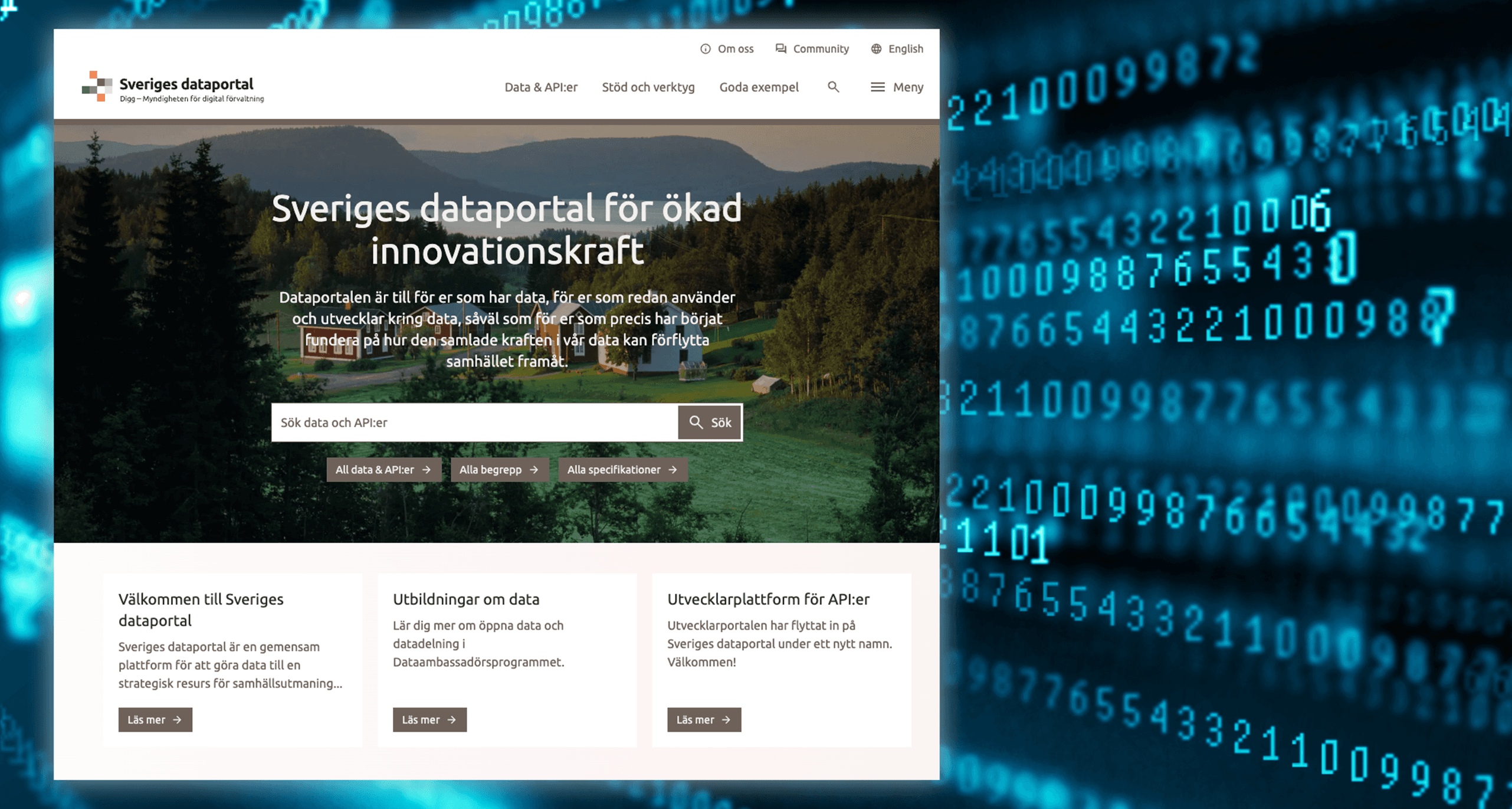High time to use data as a strategic resource
Data is an important strategic resource that creates benefits in a number of different areas of society. IoT Sweden had a chat with Josefin Lassinantti, open data specialist at Digg and product owner of Sveriges dataportal, Sweden’s national data portal.
Hello there Josefin! You are the product owner of Sveriges dataportal, which is managed by Digg, the Agency for Digital Government. What is the overall purpose of dataportal.se?
“Digg has been tasked by the Government to maintain a register of available datasets, which is the data portal. The main purpose is to enable the sharing of data and make it easier for those who want to use these datasets for different purposes. The intention is for the data to reach society and create benefits. The data portal is for everyone, from public organisations to businesses to individuals.”
Can you explain why data is a strategic resource for society?
“Data is a strategic resource in so many different ways. We are currently living in an era where much is data-driven. The digitalisation of society is based on access to data and being able to manage data effectively in different ways. Having good access to data allows us to address many of the major societal challenges, a clear example being the climate challenges. Through various types of sensor data, we can obtain information on, for example, floods, water monitoring and so on.”
“Data needs to be used strategically for purposes such as developing new services, analyses, research and forecasting. Making data available also has an inherent democratic aspect. Citizens should be able to access data and have confidence in it. In these times of widespread disinformation, it is very important to have access to and trust in facts.”
“AI is also a technology that is largely based on access to data, both for actual development and for testing. This makes it crucial that there is good access to data.”

How can municipalities and regions use dataportal.se?
“In addition to sharing data for further utilisation, municipalities and regions can also work towards becoming data users themselves to a greater extent. There is huge potential to make greater use of data from authorities or data from neighbouring municipalities or regions in various collaborative projects. Geodata is one example of data that all municipalities and regions use to varying degrees.”
Why is this not done to a greater extent?
“I think a change of approach is needed here. The issue of data needs to be prioritised, and this can sometimes be a challenge. At present, municipal and regional datasets are not always structured in the same way, which creates difficulties in utilising each other’s data.”
Why are open data and data sharing important?
“The public sector is funded by taxes, and citizens have the right to access public information. The increasing degree of digitalisation over the last twenty years means that “access” to data and information has to be adapted. It is no longer enough to simply access information and data on paper or as a PDF.”
“Data is the linchpin of so many different processes and development environments, and better use of data has the potential to be a game changer in addressing many societal challenges. I think we have yet to realise the full power of innovation in terms of what increased access to data can lead to.”
An updated version of Sveriges dataportal was recently released. What are the main improvements that have been made?
“One of the main changes to dataportal.se is that we have transitioned from being a portal focused on our digital catalogue to serving as a broader digital arena for collaboration related to data and innovation. We have made many useful updates that will make it easier to use the portal. An important improvement is that we show the benefits more clearly. For example, we have a section with good examples and also present major collaborative data initiatives that may be of interest to many.”
Is the Swedish public sector generally good at recognising data as a strategic resource? Is there a willingness to share data?
“Many people are willing to share data, but there are also many who are unsure. In practical terms, it can sometimes be difficult and costly, and since data sharing is part of a larger digital transformation that includes basic data management, it requires both willingness and commitment. We find that the challenge is greater for smaller public actors, such as smaller municipalities, and this is unfortunate.”
What can be done about this?
“Above all, we need more data to be shared by more actors, and more standardisation so that it is easier to use data. One example is that as long as you do not get the same data from all municipalities in a region, it will be difficult to build regional services, or to conduct regional research on such data.”
“Another major area of improvement is that we must begin to recognise that datasets and their life cycle are separate from the IT systems or IT artefacts that produce or manage data, which have a completely different lifespan. When you consider this to be the same thing, there is a risk that important conditions for data sharing will not be created, for example in the procurement phase. Many datasets are locked up in various ways already during the procurement, and this becomes costly for many.”
IoT Sweden’s projects focus in particular on the use of IoT data or connected data in various applications to create societal benefits. How can they benefit from dataportal.se?
“IoT Sweden’s projects can benefit from the data portal by both sharing data that others can use, and being able to find other data that can be used with their own data. At Digg, we welcome others to send us good examples of how different datasets have been utilised.”
Is there access to open data within the European Union?
“Yes, there is a European data portal, and all data in Sveriges dataportal is harvested for this.”
What are the next developments planned for Sveriges dataportal?
“As I said, we have made a shift from a focus on only data sharing and data access towards also becoming an arena for collaboration and innovation creation in relation to data. We will now continue to work with and scale up the content in a systematic and controlled manner, and we will have a special focus on bringing in good examples of how data is used and creates benefits. We know that this is very much in demand. But things are happening all the time in this area, so I can confidently promise that there are more things to come with Sveriges dataportal – so keep an eye out!”
